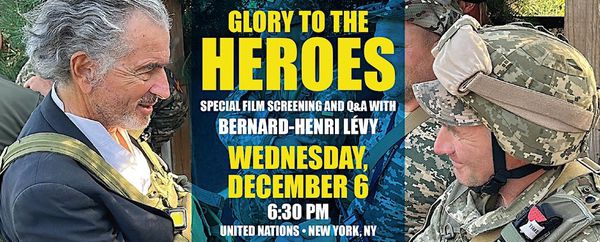 |
| Bernard-Henri Lévy presented Glory To The Heroes at the United Nations |
In the second instalment with Bernard-Henri Lévy, the director of Glory To The Heroes (L'Ukraine Au Cœur, produced by Emily Hamilton), The Will To See (Une Autre Idée Du Monde, executive produced by Emily Hamilton, produced by Kristina Larsen) and Slava Ukraini (produced by François Margolin, associate produced by Emily Hamilton), all co-directed with Marc Roussel and with Gilles Hertzog as special advisor, we discussed the past informing the present and the urgent need to not drop the case for support of Ukraine by going back to show the reality of war again “without any special effects, without any Hollywoodisation, with little editing.”
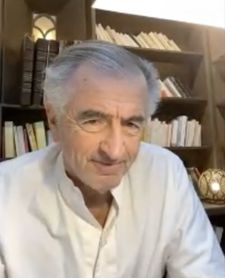 |
| Bernard-Henri Lévy: “My problem, my default probably, is that I have memory. Because I love history, I reflect about history …” |
It is the summer of 2023 and the first images in Glory To The Heroes remind us of the deluge. They are from the city of Kherson in June, a town under water, because the nearby Kakhovka dam was blown up on the sixth of that month by the Russian military, committing urbicide and ecocide. Lévy calls it the “Flooded Earth Strategy,” the latest update and variation on Hitler’s “Scorched Earth.” A small dog balances on a precarious plank across the water, the inhabitants in the midst of this man-made disaster already heroically start rebuilding the damage.
Another danger, Lévy emphasises, is the specter of the 1938 Munich Agreement, in which Sudetenland was handed over for Nazi Germany’s annexation, so alarmingly evoked by some present-day campaigning US politicians and those holding office who speak of a compromise from far far away that doesn’t seem to take into consideration the will of the Ukrainian people.
At one point Lévy asks “Where’s the frontline?” And a shot rings out, followed by an explosion, the frontline is here and now as the filmmaker is quickly shuttled to safety. “They stay while I leave.” Odesa, the city named by the Russian empress Catherine the Great, while still spared during the making of Slava Ukraini, was attacked this July, which left the Cathedral of Transfiguration destroyed and the grain shipments into the wider world grounded. Lévy reminds us of the Holodomor, Stalin’s deliberate starvation policy in the early 1930s, but also that Ulysses gave Odesa its name and that a Battle of Troy is raging.
History, to paraphrase Faulkner, is never dead, it’s not even history.
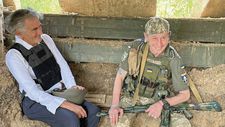 |
| Bernard-Henri Lévy: “They see that there are some foreigners, who happen to be French, who are faithful to them, who are loyal, who come back.” |
From not in Paris, Bernard-Henri Lévy joined me on Zoom for an in-depth conversation on Glory To The Heroes (L'Ukraine Au Cœur).
Anne-Katrin Titze: The connection to history is always present. At the ending of the prologue you say a sentence that gave me chills. “It is with fear of a brewing Munich on our minds that we set out towards the East.” That is the bone-chilling arguing by some politicians about compromise, about a possible Munich agreement-style compromise, to happen about Ukraine. It’s very much at the core of the film.
Bernard-Henri Lévy: Absolutely! My problem, my default probably, is that I have memory. Because I love history, I reflect about history and I cannot prevent myself from seeing and connecting the actual scenes that I see with what I know from the past. I know in this situation that any compromise with Putin would be a terrible mistake and it would lead to new multiple and terrible other compromises and defeats and bloodbaths and so on. We have to stop Putin and his mates, his accomplices, his friends, his allies at this point. And for me, after this third film, it’s already very late. So much suffering, so many deaths.
AKT: Some of the images are revisiting. Six months later you are reuniting under the same bridge, Antonivsky Bridge, I took note. It must have meant so much to those men to see you and your crew again.
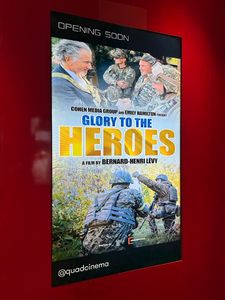 |
| Glory To The Heroes poster at the Quad Cinema Photo: Anne Katrin Titze |
BHL: So much, I don’t know. But at least they, in their utter and total suffering and pain, they see that there are some foreigners, who happen to be French, who are faithful to them, who are loyal, who come back. They see that, yeah. I would not say that it changes the situation for them, the only thing really crucial for them would be to receive the weapons. But to receive the visit of someone who does not drop the case, who does not abandon them, who comes back - probably they were happy, yeah.
AKT: I can only imagine, because often someone comes, makes a documentary, and leaves forever. You don’t do that. I think you said it after the first film, if I have to go back, I go back. One of the questions you ask in this film is whether you have to show the enemy and if so, how. And the decision is yes, you do show captured prisoners. It’s a very important part of the film and I’m glad you did. Tell me about that decision!
BHL: The decision was hard to make because my point of view, of course, is the point of view that I am on the side of the Ukrainians morally, politically, and physically - I am on their side. Even for consistency, normally I would not have envisioned to show the other side. Even as a matter of cinematographic consistency, the choice was that, to stand with Ukrainians, to take side with them and so on.
But one day we were in the area of Klishchiivka, which was one of the hardest frontlines, where the combats were the strongest and the fiercest.
And I knew that one prisoner had just been taken and then a second one and then on the same day the third one. I thought about it; should I see them or not. There is also the moral consideration and the law consideration, the Geneva Convention. Is the prisoner free in his speech? How can he speak without putting himself in danger when he comes back after the war to his country? Etcetera.
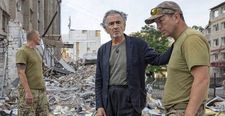 |
| Bernard-Henri Lévy: “I cannot prevent myself from seeing and connecting the actual scenes that I see with what I know from the past.” |
So I replied to all these questions. I made sure that my interview was faithful to the Geneva Convention and then I discovered what they told me was more than crucial, more than useful. What they told me, in my eyes, showed more about the state of the Russian army than all that I read in the newspapers for two years. They say it all in six minutes. That is a sort of portrait of the Russian army - cowardice, lack of preparation, lack of motivation, the corruption of the commanders, the state of slavery in which the soldiers are held.
These three interviews in a few minutes, six or seven maybe, say it all. And I felt that it was my duty to show that. After having been sure that these three men are free of their speech - I made sure there was nobody except me and my cameraman and my personal translator in the room or around or behind the door. I made sure till the last minute that they were happy with me making public their testimony, and that I blurred their faces, as you know. With these being done, I thought that it was utterly useful to have this picture of the Russian army through their eyes, their narrative.
AKT: Absolutely! Cannon fodder is what they describe. Sold to a private army for 25,000 roubles each. One of them even calls it slavery. It’s very important information.
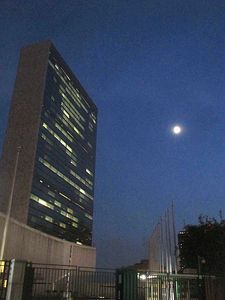 |
| Slava Ukraini was also screened at the United Nations in 2023 Photo: Anne Katrin Titze |
BHL: As you probably understand, they were sold to a private army by their commander, their government commander.
AKT: Yes, I got that.
BHL: It was not by a private army to another one, but from the public army to a private army, which gives us an idea certainly of the state of moral and economic corruption of the so-called second army in the world.
AKT: You prepare us in the previous chapter with proof of how the Russian army doesn’t take their dead soldiers. And we see hanging mines in the forest. It builds up to a very clear picture that I think we need to see.
BHL: I think so. It was good to show the war as it is. And again without any special effects, without any Hollywoodisation, with little editing. The film is very lightly edited. I hope that it shows the reality of this war as it is in reality, in truth.
Read what Bernard-Henri Lévy had to say on the score by Slava Vakarchuk for Glory To The Heroes and the Ukrainian children, “heroic civilians” and “thoughtful soldiers.”
Glory To The Heroes opens at the Quad Cinema in New York on Friday, December 8.





















